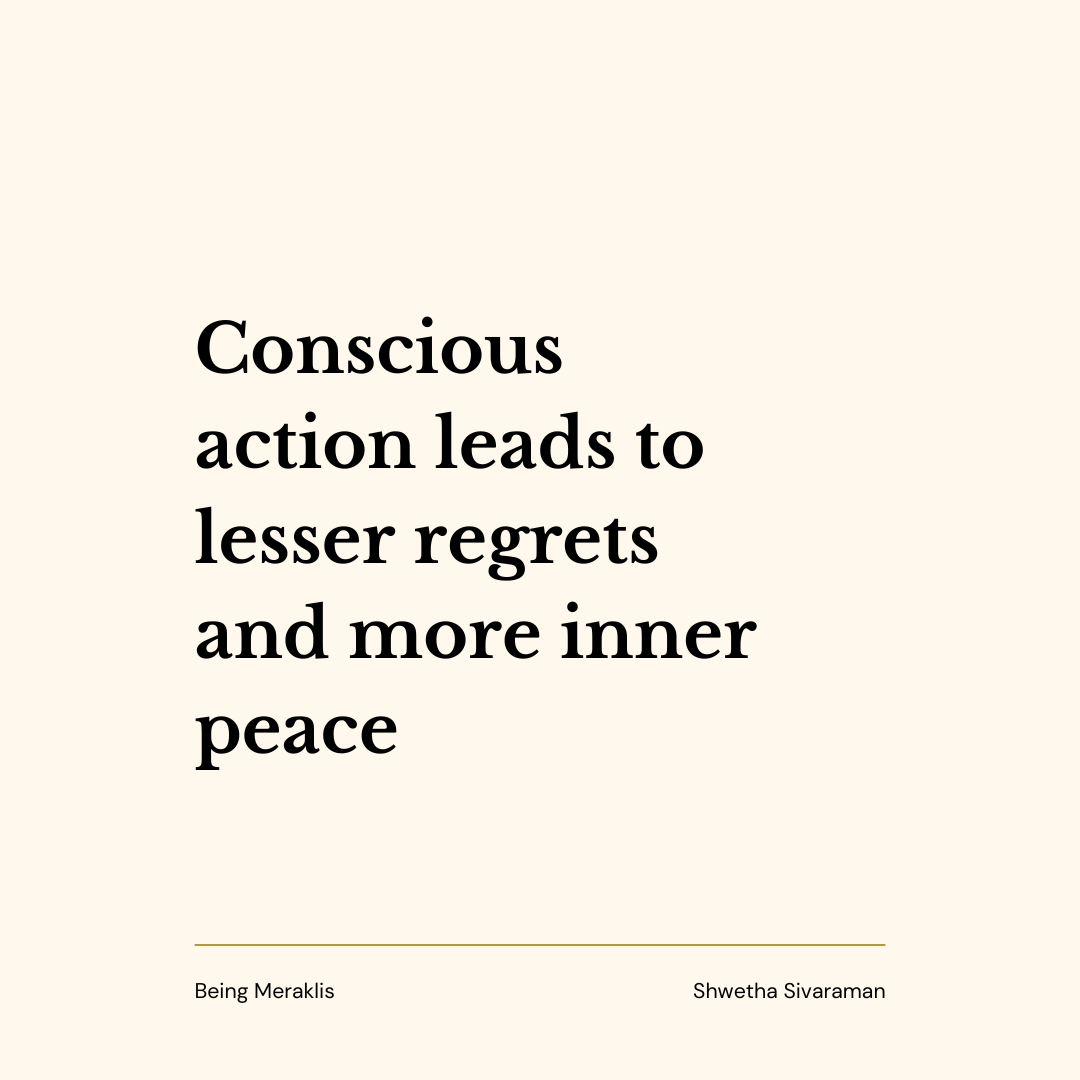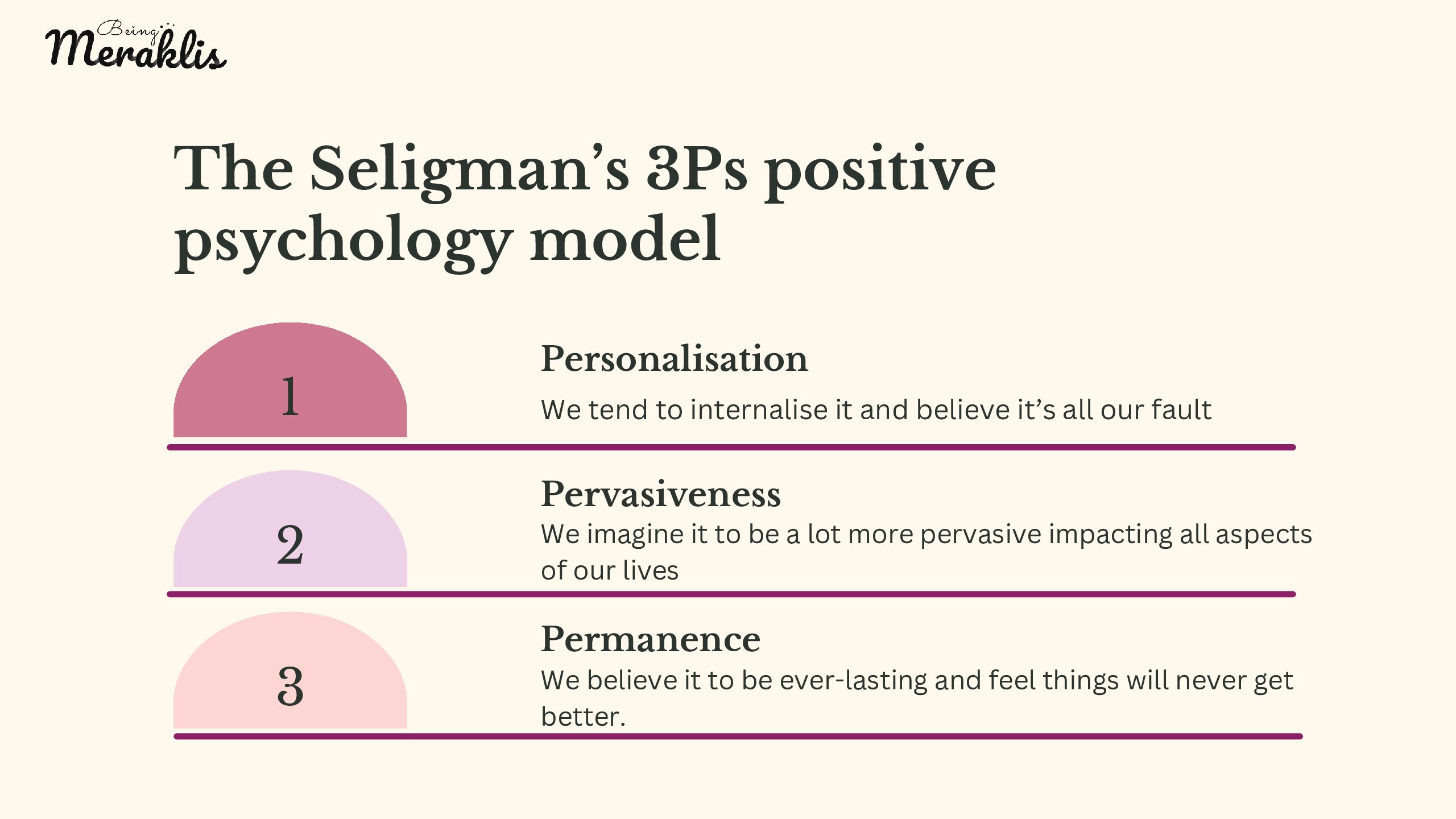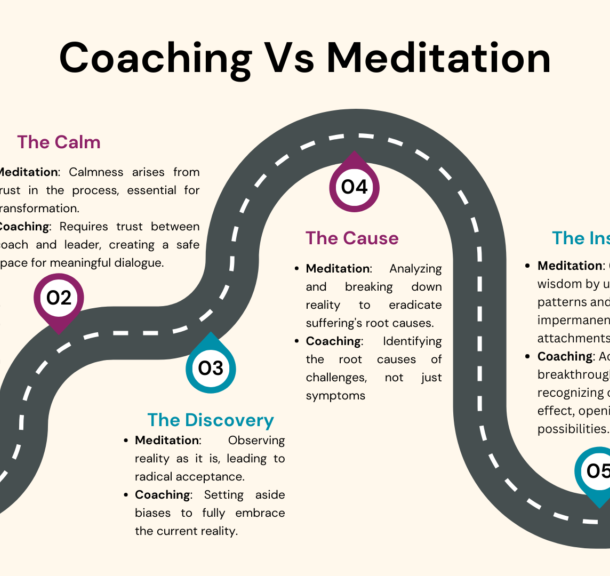
Having been a high achiever and still never feeling adequate for most of my life, I can tell with reasonable confidence that most of us struggle with high expectations from ourselves.
Despite our many achievements and successes, we still feel a continuous undercurrent of restlessness through our veins that never lets us rest at ease.
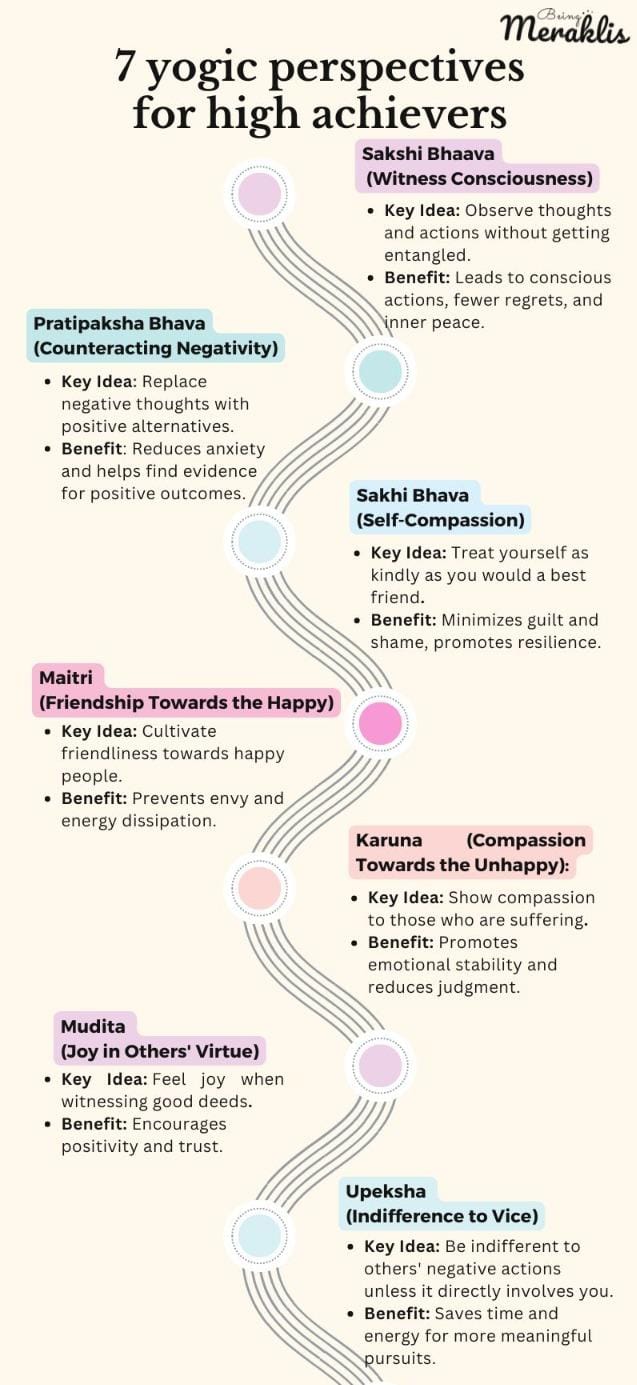
Here are some yogic perspectives that can help us recheck our expectations and find that ease or peace within.
- Sakshi Bhaava – This is a perspective offered across several indic scriptures. There are references to it in the Gita, Yoga Sutras, and Vedanta. Often, we get caught up in a whirlwind of thoughts at work and in our relationships. We lose all sense of perspective and move from one day to the next without any examination, reflection, or introspection.
Sakshi Bhaava is to become a witness and observe what’s happening internally over some time. Noticing your breath, observing your thought or behavioural patterns without getting involved or pursuing a chain of thought.
Why is this important? Often when we run lives on autopilot, we are unconsciously governed by the nature of our thoughts.
Say we are afraid a co-worker is going to outsmart us to get the promotion over us, we start doing and saying things to discredit the coworker even before we examine the fear in our heads. Is it a real threat or an imagined one? We never stop to question our beliefs and assumptions. Instead, we choose to act in haste and repent in leisure.
Practising Sakshi Bhava regularly can help high achievers observe the basis of their actions and consciously choose to act. This means conscious action and lesser regrets and resentment. Imagine the ease!
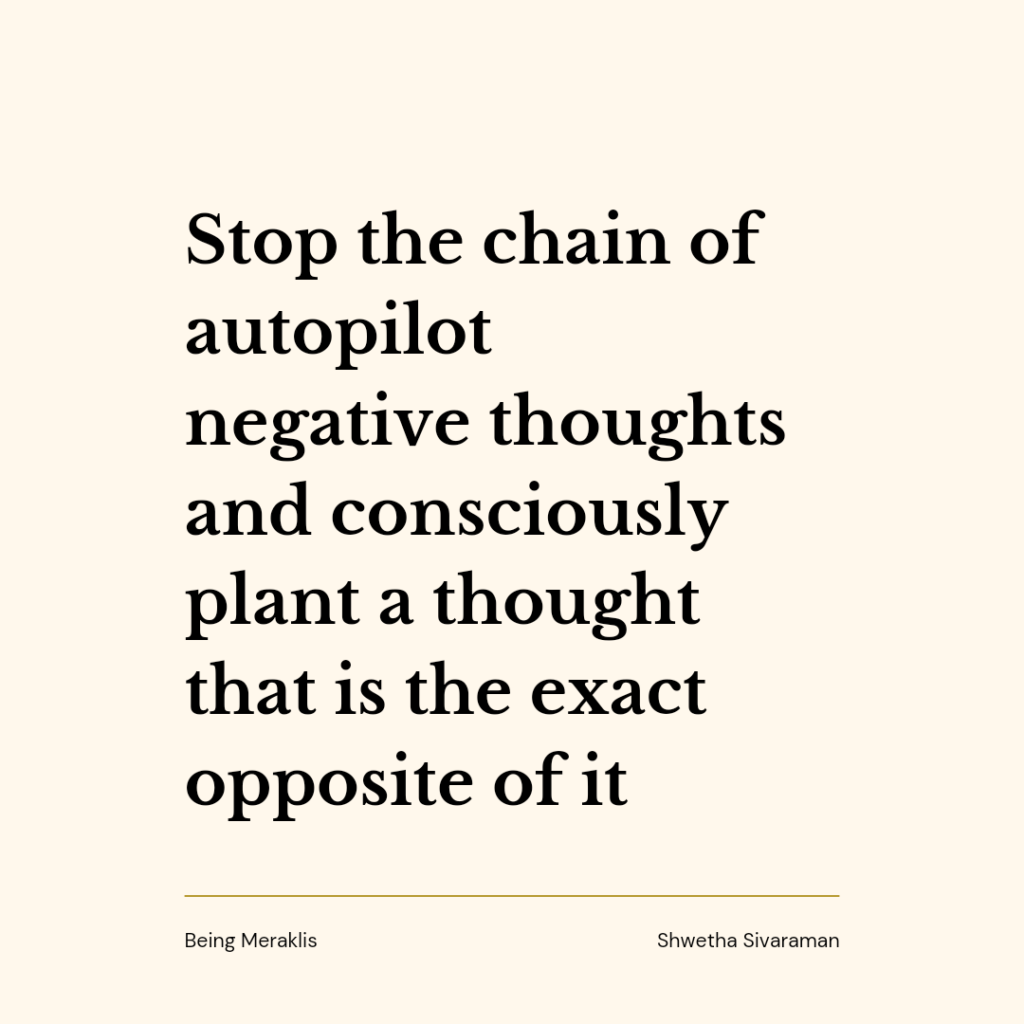
2. Pratipaksha Bhava – For most of us, our monkey minds run amok, from one shiny object to the next, without a pause. But our minds also have a negativity bias, thanks to our inbuilt survival mechanism – Default Mode Network. This means that our minds are automatically wired to think worst worst-case scenarios to ensure our survival.
We’ve all experienced that not all we think is true. As Seneca says, we suffer more in imagination than in our reality.
A classic high achiever example is to think we are going to be fired despite being the top 5% contributors in the team or the organization.
In such cases, yoga says why not think the opposite – Stop the chain of autopilot negative thoughts and consciously plant a thought that is the exact opposite of it?
So when the mind is going down the drain if I’m going to be fired, take a moment to think what if I’m rewarded for taking this risk?
Two things will happen, one you’ll realise the mind stops going down the negative trail. Second, you’ll see how quickly it will find evidence to support the counterthought. If we observe this enough number of times, we will stop allowing our thoughts to consume our lives. We will keep it at a distance, recognising its instability and lack of accuracy.
3. Sakhi Bhava: As high achievers, if there’s one common trait, it is how hard we are on ourselves. We have unreasonably high expectations of ourselves and don’t allow room for any mistakes. Our kindness and generosity are extended to the worst of enemies but never to ourselves. The inner critic in us is ruthless in her judgements and bullies us like no one else. That’s where sakhi bhava becomes so useful. Sakhi Bhava means being our own best friend.
Minding our self-talk to such an extent that we only utter things we’d dare to tell our best friend. If your best friend comes to you and tells you she made a mistake, you won’t beat her up by saying how stupid can she be, would you? You’d tell her it’s okay! Mistakes happen! We’ve all been there. We can fix this. It’s about extending the same compassion towards oneself. By accepting our humanness and being a friend to ourselves, we can save ourselves from the guilt and shame spirals that we spend half our lives in. Instead, we pick ourselves up faster, dust off the errors, and begin again with more renewed energy, spirit, and courage.
Patanjali talks about 4 qualities aspirants should adopt for citta prasadanam (or mental equipose) in the Yoga Sutras. These 4 qualities equally apply to high achievers in modern-day society.

4. Maitri towards Sukhha. Maitri means friendship. Patanjali recommends we cultivate the quality of friendship towards those who are happy.
Usually, when we see someone happy, our thoughts are “Look at him, he’s so lucky” “Barely does any work but is always at the right place and time to get recognised.” We are envious, jealous, or disgruntled when we see others happy. But these thoughts cause more disturbance in our minds. Our energies get dissipated, and we miss out on doing things we do well as well in such comparisons.
So Patanjali recommends avoiding such dissipation by cultivating the attitude of friendliness. You see such people, extend the hand of friendship, and maybe even allow their luck to rub off on you.
5. Karuna towards Dukha. Karuna means compassion. The second quality Patanjali recommends is Karuna towards those who are unhappy. When we see people unhappy, our first thoughts are to gloat.
We cherish the suffering of others, telling ourselves “He had it coming!” or “They deserve this and more.” We gloat about their miseries, and look down upon them, without realising that the roles can easily be reversed when the tides change.
To avoid such fluctuations in the mind, Patanjali recommends cultivating compassion towards those unhappy.
6. Mudita towards Punya. Mudita means pure joy or happiness. Here Patanjali recommends being joyful when you see people engaged in good or meritorious acts.
Our first reaction when we see people doing good things is suspicion. “Ah, he must have earned a lot of black money!” “Wonder what skeletons are hiding in their closet?” We suspect the goodness of every deed and view the whole world with cynicism. While Patanjali is not recommending us to be naive, he suggests cultivating the attitude of joy when we see good things around us.
7. Upeksha towards Apunya. Upeksha means indifference. This is quite a controversial opinion, but Patanjali recommends a touch of indifference when we see people engaged in not-so-good or demonic acts. We dissipate tremendous energy in tedious debates about how the world is unfair or how certain people engage in sinful activities and get away with it. While it’s good to be worldly-wise, such debates take us nowhere and waste our time, energy, and resources.
If it’s something we can control and solve as a part of our daily duties, then we must take a stand and fight injustice. But if it’s simply engaging in hypothetical arguments and endless rants that lead to no action or material difference, we can invest our energies elsewhere.
This is like that Winston Churchill quote, if on your way to success, you stop to throw a stone at every barking dog along the way, you’ll never reach your destination. You’ll engage in petty tussles with the barking dogs and get stuck there.
Similarly, as high achievers with limited time, energy and resources, we need to pick our battles and cultivate an attitude of indifference to unjust and sinful activity around us.
Which of these 7 perspectives are you going to pick up and start applying?
